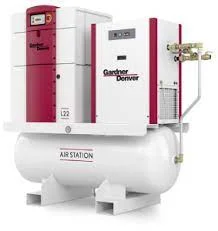
 While the ‘too much’ point for water in a compressed air system varies according to its application, we all know the effects of that water in the system. It can collect in your pipes and equipment where it can cause rust and require premature replacement of the various system components. Additional leaks increase running costs (A single leak may cost you $2,000 per year). Finally water in air means water in your tools damaging them or you end up with air that doesn’t meet compliance standards.
While the ‘too much’ point for water in a compressed air system varies according to its application, we all know the effects of that water in the system. It can collect in your pipes and equipment where it can cause rust and require premature replacement of the various system components. Additional leaks increase running costs (A single leak may cost you $2,000 per year). Finally water in air means water in your tools damaging them or you end up with air that doesn’t meet compliance standards.
Humidity – The bane of air compressors and compressed air systems.
We all know air has water in it – they tell us how much on the news every night when they report humidity. In Atlanta we see an average relative humidity of 82% in the morning and 52% in the afternoon. {https://www.currentresults.com/Weather/Georgia/humidity-annual.php}
Thank goodness for air conditioning, right? The point is there is a lot of water in the air.
When your compressor is running that means that water in the air is going to be sucked into the compressor along with the air and the particulates. When we compress air it gets hot, basic physics. PV=nRT. While the air is hot it can hold all that atmospheric water. However, as the temperature starts to decrease it can hold less of that water as a vapor, so it condenses.
The water in your compressed air condenses the same way. Then you have water in your pipes, in your tools. Exactly where you don’t it want to be.
Remember, there are also other forms of impurities in compressed air including oils (from the compressor, if you haven’t switched to an oil-less) and other particulates. You need to be very clear about the end quality/qualities of air you require for your systems and processes. The more pure/higher the quality you need the more capital investment and running cost you’ll incur.
Once you know your requirements it’s very easy for us to recommend a solution. For air at the lower end of the purity spectrum, it might be enough just to have a good filtration system. For higher quality air, a dryer might be the best course of action. However with the high relative humidity in Georgia, it make sense to install a dryer to reduce maintenance costs.
For industrial applications, installing a Non-Cycling Air Dryer would be the best alternative. It’s easy to install, its energy efficient and will provide air quality that is suitable for those purposes. Gardner Denver’s RNC Series of Non-cycling air dryers are designed to be energy efficient and provide a low pressure drop in the system while they operate.
For food/medical/pharmaceutical grade air, Gardner Denver’s RNC Series can be customized to meet the relevant standards while still being easy to install and energy efficient.
If you need to get water out of your compressed air system, then give the team at Pye-Barker a call on 404-363-6000 or drop us a line at sales@pyebarker.com. We can come and inspect your compressed air system and see how we can help you to meet your air quality standards and reduce your operating and maintenance costs.


